by Gary Lord
Home - Genesis - 2007 - 2008 - 2009 - Early 2010 - Mid 2010 - Late 2010 - End 2010 - Early 2011 - Mid 2011 - Late 2011 - End 2011 - Early 2012 - Late 2012 - Early 2013- Late 2013 - 2014 - 2015 - Early 2016 - Late 2016 - 2017-19
Chapter Nineteen: Early 2016
Hillary Clinton’s Emails
2016 was supposed to be a big year for Hillary Clinton. The US Secretary of State was widely expected to be elected President on the 8th of November. But things started badly…
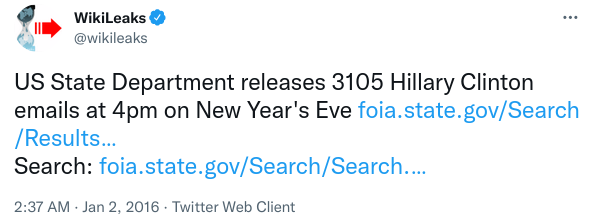
Like CIA Director John Brennan (see previous chapter) Hillary Clinton had been caught out using private email accounts and even private email servers rather than secure US government email technology. In response to numerous Freedom of Information requests, the State Department began releasing Clinton’s work-related mails, in batches of thousands, with over 1,300 of them classified — some at a level higher than Top Secret. Clinton’s personal email server was seized by the FBI, who began investigating her for potential mishandling of classified information.
While Hillary Clinton’s failure to follow security protocols sparked outrage - at 68 years old, she reportedly clung to her old Blackberry device because she lacked the technical skill to adopt new habits - the contents of many emails were also scandalous in themselves.
Among the revelations: emails showing that Clinton had been personally tracking the Assange extradition hearings; had discussed how to spin WikiLeaks revelations; and had even talked to China about WikiLeaks.
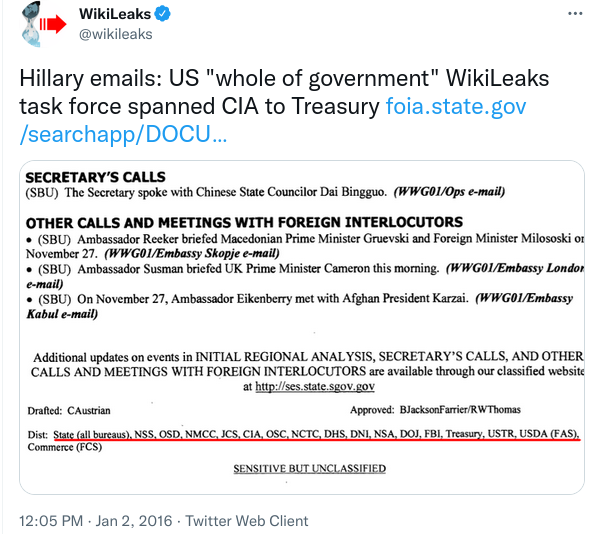
On 16 March 2016 WikiLeaks published a searchable archive containing all 50,547 pages of the Clinton emails and attached documents - dated from 30 June 2010 to 12 August 2014 - which had so far been released by the State Department. There would be more to come later in the year.
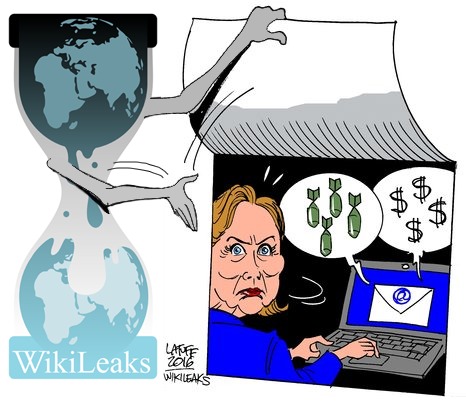
*
UNWGAD Decision
On 5 February 2016, after many months of investigation, with input from government officials from Sweden, Ecuador and Britain, the United Nations Working Group on Arbitrary Detention (UNWGAD) finally declared that Julian Assange had been arbitrarily detained since his arrest on 7 December 2010. They ruled that his detention "should be brought to an end and that Mr. Assange should be afforded the right to compensation".
The Working Group was comprised of legal experts from several countries. Its decisions were described as "legally-binding to the extent that they are based on binding international human rights law, such as the International Covenant on Civil and Political Rights."
"The binding nature of its opinions derives from the collaboration by States in the procedure, the adversarial nature of is findings and also by the authority given to the WGAD by the UN Human Rights Council. The Opinions of the WGAD are also considered as authoritative by prominent international and regional judicial institutions, including the European Court of Human Rights."
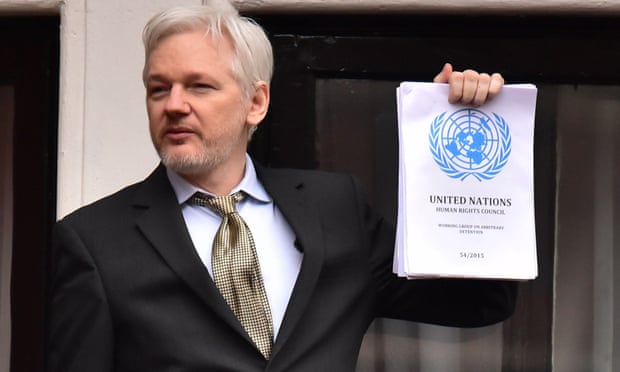
A delighted Julian Assange made a statement to supporters from the Ecuadorian embassy’s balcony, waving a copy of the UN report, and declared it a "sweet" victory that "cannot be denied".
“It is a victory of historical importance for me, my family, my children, and for the independence of the UN system.”
The UK government responded immediately, claiming the UN group’s ruling was not binding:
“This changes nothing. We completely reject any claim that Julian Assange is a victim of arbitrary detention. The UK has already made clear to the UN that we will formally contest the working group’s opinion."
UK Prime Minister David Cameron called the UN decision “ridiculous” while the Foreign Secretary called it “flawed in law”. The Home Office insisted that Assange’s human rights had "been protected throughout the process and will continue to be protected if and when he is extradited to Sweden.” This claim was somewhat damaged by the fact that Cameron’s Conservative Party had won another term at the 2015 general election while pledging to scrap the UK Human Rights Act. They said this would remove the European Court of Human Rights’ "leverage" over Britain’s Supreme Court. British citizens would still be entitled to appeal to the Strasbourg-based court - but Assange was not a British citizen.
Sweden also ignored the UN ruling and turned down a request from Assange’s lawyers to drop the case. Australia’s Foreign Minister, Julie Bishop, said she had read the report and was "seeking legal advice". The advice quickly arrived from within her own department: Australia should "not seek to 'resolve' Mr Assange’s case" because "we have full confidence in the UK and Swedish judicial system.’
The Guardian newspaper ran not just one but two stories on the same day condemning the UN decision. The Telegraph claimed that the Working Group had "embarrassed the United Nations". Four days later, a UK poll found that two in three Britons did not believe Assange was being arbitrarily detained. The British public were increasingly negative towards Assange, with his net favourability falling from minus 11 in 2013 to minus 26 in 2016. Kristinn Hrafnsson observed that UK public opinion was clearly being shaped by media attacks on Assange and UN officials.
“The opinion is not surprising when the UK government calls the UN’s finding “ridiculous” and the press almost unanimously attacks it. The Guardian rejected it editorially on Friday morning, even before the UN arguments in the case where announced. What is surprising is that the determination to deprive Mr Assange of justice runs so deep, that parties are willing to undermine and attempt to destroy, the credibility of UN mechanisms, instrumental in the international battle for human rights.”
When Britain formally applied for a review of the UN group’s ruling in March, Assange’s lawyer Melinda Taylor noted the inconsistency of their responses:
“The fact that they have submitted this request for reconsideration undermines their previous assertion that they weren’t in any way bound to comply with its opinion.”
Taylor said that Britain and Sweden risked becoming "rogue nations" by defying a UN human rights ruling.
"You can’t just support the United Nations when it says what you want it to say. Laws have to be universal and they have to be applied universally. If the UK and Sweden are serious about the UN being impartial and effective, they can’t allow these double standards to be propagated."
Professor Mads Andenas, a former chair of the UN working group, warned that Britain was setting a dangerous precedent by defying the ruling, and UK politicians were "weakening the authority of the UN body for short-term opportunistic gain".
“I fear that these politicians have weakened the international community’s possibility to protect some of the most vulnerable victims of human rights violations. Their words have circulated among the states responsible for the worst human rights violations. The words of these UK politicians will cost life and human suffering.
An open letter condemning Sweden and the UK for "setting a dangerous precedent" and undermining the U.N. human rights system was published by a group of five hundred high profile Assange supporters. Signatories included journalists John Pilger and Glenn Greenwald, dissident Chinese artist Ai Weiwei, Indian writer Arundhati Roy, human rights campaigner Peter Tatchell, former Greek Finance Minister Yanis Varoufakis, Irish peace activist Mairead Maguire, film director Ken Loach, musician Brian Eno, author Naomi Klein, Professor Noam Chomsky, several Nobel Prize winners and numerous human rights organisations.
Following the UK’s requested review, with no new evidence provided, the UN working group maintained their decision that Assange was being arbitrarily detained, and that he should be immediately released and compensated. Britain continued to ignore the ruling.
*
Love Finds A Way
Inside the Ecuadorian embassy, meanwhile, the mood was upbeat. As one of Assange’s lawyers later stated: "it just seemed like a matter of time before Julian was free".
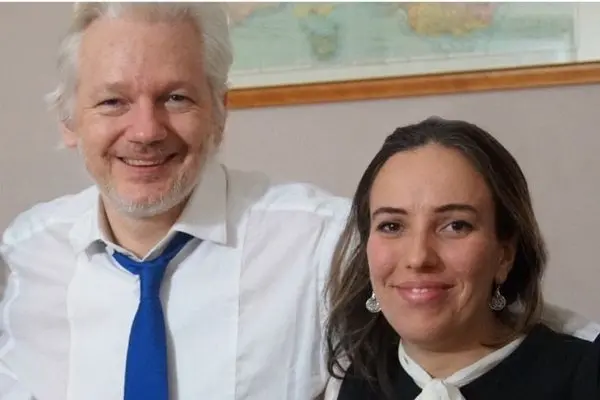
That lawyer was Stella Moris (born Sara Gonzalez Devant, pictured above) and by now she was in a serious long-term - but extremely secret - relationship with Julian Assange. Wary of being spied on, the couple used furniture and blankets to build tents for privacy inside the embassy.
"We actually started a family before things got frightening – we decided to when Julian had just won his case at the UN that said he was arbitrarily detained … There were no US charges at the time.
"We decided to start a family, and then things just got really, really frightening, to the extent that I feared for Julian’s life, I feared for my own safety, and that hasn’t changed."
The pair got engaged in 2017. They attempted to get married inside the Ecuadorian embassy but "the relationship with the Ecuadorian government deteriorated and it wasn’t really viable at the time".
Two children were conceived while Assange was still trapped inside the embassy - Gabriel was born in 2017 and Max in 2019. The couple finally got married inside Belmarsh prison on 23 March 2022.
*
Asylum Becomes Risk
Following the Oscar-winning success of her 2013 Snowden movie "Citizenfour", Laura Poitras had returned to her original project; a fly-on-the-wall documentary about the struggles of WikiLeaks and Julian Assange. Poitras had been given extraordinary access to the WikiLeaks team since 2011, and had filmed many key moments including Assange’s phone call to Hillary Clinton and his motorbike ride to the Ecuadorian embassy. Her new project was originally titled "Asylum" and the plan was to screen it as thirteen short episodes.
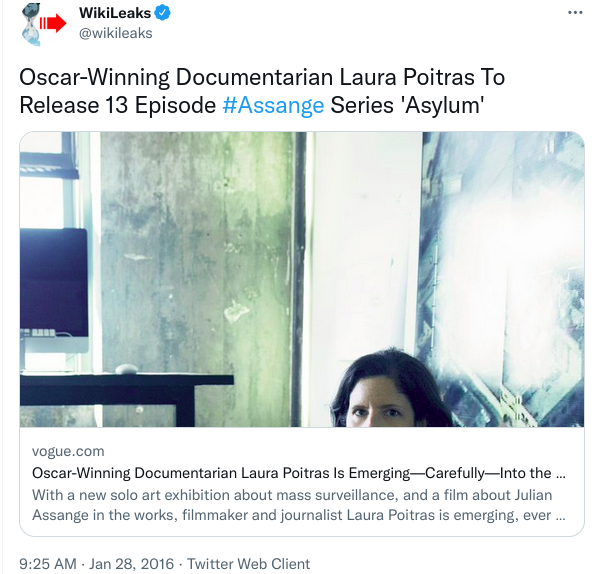
But then something happened; Poitras became romantically involved with WikiLeaks insider Jacob Appelbaum while living in Germany, and they had an unpleasant split-up. As she was editing the final version of her project back home in New York, Poitras became increasingly involved in the narrative, talking about her own confused feelings rather than maintaining an objective focus on her subjects' unfolding drama.
The WikiLeaks team, who had been excited by early previews, were surprised and disappointed when the final cut prioritised Poitras' own emotional journey above the shocking attacks on Assange and WikiLeaks' historic efforts to promote transparency. Key scenes suggested Assange had a bad attitude towards women, which only played into his critics' hands.
The movie "RISK", first released in May 2016, was a flop. According to RottenTomatoes, the film made only $197,000 at the box office, a long way from the $3 million earned by Citizenfour, with an audience rating of only 52%. Even the Guardian criticized the movie’s "lack of objectivity".
In fact the final film, streamed by Showtime in 2017, was so different from the first cut that it prompted a team of four concerned WikiLeaks lawyers (all women) to write a Newsweek article claiming that it "places our clients in legal jeopardy". They said Poitras had "reneged on written agreements with WikiLeaks that explicitly forbid her from editing the footage in the United States" where US authorities could seize the material.
"Poitras has also violated her unambiguous promise to the subjects of the film that they would have an opportunity to review the film in advance and request changes, and that they could decline to appear if they or their lawyers felt that the movie put them at risk…
"Prior to its initial U.S. release, seven of the participants submitted non-consent forms to the producers advising Poitras and her team that they did not want to appear in the film. Regardless, Poitras went ahead and released it."
The lawyers said that Poitras had "marginalized and demeaned a number of women who work for WikiLeaks" and instead focussed on "women taking instructions and throwing off adoring looks." Sarah Harrison, who played a critical role in Citizenfour, was now "depicted as little more than a minion."
*
Meanwhile, following Poitras' depture from Berlin, Jacob Applebaum found himself embroiled in a growing sex scandal. The longtime activist and Tor developer was accused of numerous historical sexual demeanours by a variety of women, and forced to defend himself:
“These unsubstantiated and unfounded attacks have become so aggressive that I feel it’s necessary to set the record straight … I want to be clear: the accusations of criminal sexual misconduct against me are entirely false.”
Applebaum, who was openly queer and admitted to enjoying kinky sex, was never charged with any crime, and at least one woman who was named as a rape victim denied the claim. Nevertheless, numerous organisations rushed to disassociate themselves from him, prompting a group of female associates to write a letter of support. In June 2016 the appartment building where Applebaum lived was defaced with grafitti. Having already been harrassed repeatedly by US authorities, and named in legal threats against WikiLeaks, Applebaum felt forced to terminate his public activism.
*
Death of Michael Ratner
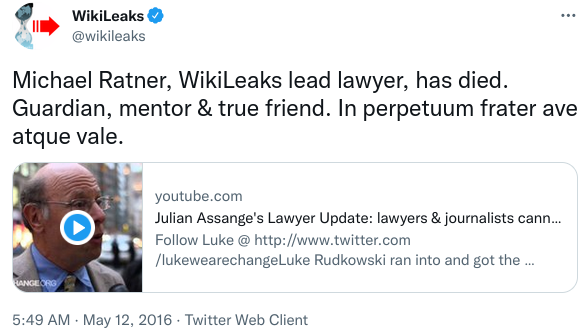
On 11 May 2016 Michael Ratner, Julian Assange’s chief attorney in the USA, died at the age of 72. Assange praised him as "a personal friend and adviser" who had taken on many intimidating cases for WikiLeaks, but was also a role model to many others around the world. A Guardian obituary noted that Ratner had "galvanised 500 US lawyers of various political persuasions to challenge the legality" of Guantanamo Bay detentions.
During his career, Ratner sued three US presidents: Ronald Reagan, Bill Clinton and George W Bush, and passionately argued for the impeachment of the latter for warrantless surveillance, torture, misleading Congress about the Iraq war, and violating the constitution’s separation of powers.
The Center for Constitutional Rights, a not-for-profit legal advocacy organization where Ratner worked for 45 years, said Ratner’s passion was "not just for the law but for the struggle for justice and peace.”
Assange observed that Ratner was not bound by the US Exceptionalism that limited so many other US lawyers:
"He was genuinely concerned about people in Guatemala, about me, as an Australian, about people who face similar problems in Palestine, about people who have been extradited from the United Kingdom. And he was able to work with these other groups and other lawyers across jurisdictions, because they perceived that his genuine human concern for them was not simply about grabbing some prize that he could take back to the United States and exploit within his own, if you like, New York constituency."
*
Ding-Dong!
On 12 June 2016, in a British TV interview, Julian Assange revealed that WikiLeaks was preparing to publish even more Hillary Clinton emails.
“We have upcoming leaks in relation to Hillary Clinton," said Assange. "We have emails pending publication, that is correct.”

Two days later, on 14 June, the Washington Post reported that Russian hackers had stolen DNC research on Donald Trump, as well as DNC chats and emails. The Post quoted Shawn Henry, former executive assistant director of the FBI’s Criminal, Cyber, Response and Services Branch, who was now president of CrowdStrike, a cyber security firm that had been chosen by the DNC to examine the breach.
Some of the hackers had access to the DNC network for about a year, but all were expelled over the past weekend in a major computer clean-up campaign, the committee officials and experts said.
The Post reported that DNC leaders were first "tipped to the hack in late April".
“When we discovered the intrusion, we treated this like the serious incident it is and reached out to CrowdStrike immediately,” said Rep. Debbie Wasserman Schultz (D-Fla.), the DNC chairwoman.
Crowdstrike’s co-founder and chief technology officer, Russian-born Dmitri Alperovitch, claimed there were two groups of hackers, "both working for the Russian government"; one team they dubbed "Cozy Bear" was monitoring DNC emails and chat, while the other they called "Fancy Bear" was targeting the DNC’s opposition research. Alperovitch claimed that these teams had been targeting US government sites for years.
The next day, 15 June, a hacker named Guccifer 2.0 denied the Russian government connection and claimed sole responsibility for the hack. To prove himself, he posted a DNC report on Donald Trump and other DNC documents in a blog post. He then stated:
"The main part of the papers, thousands of files and mails, I gave to Wikileaks. They will publish them soon."
On 20 June, Guccifer 2.0 opened a Twitter account. He continued to post DNC files online, and continued claiming to be in communication with WikiLeaks.
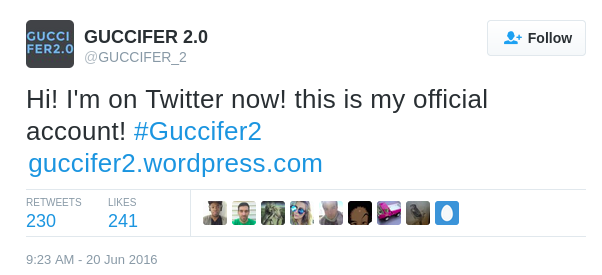
The original Guccifer was a Romanian hacker named Marcel Lazar Lehel who had hacked the emails of President George W. Bush in 2013 and also claimed to have hacked Hillary Clinton’s private email server: "It was easy," he said. "Easy for me, easy for everybody". The new Guccifer 2.0 also claimed to be Romanian but appeared to be relying on Google Translate.
It is important to note that the appearance of Guccifer 2.0 and all these claims about Russian hacking came at least two days AFTER Julian Assange revealed that WikiLeaks had more Clinton emails to publish. Furthermore, the key evidence of Russian hacking was provided by Crowdstrike, who were closely linked to the FBI. Crowdstrike was largely funded by Google Capital, and their executive team included Steve Chabinsky, a former deputy assistant director of the FBI’s Cyber Division. Crowdstrike’s claims of Russian hacking were initially met with some informed skepticism.
"I’m confused by how public they’ve been," said Jason Healey, a cybersecurity researcher who used to work in the White House. "Normally this happens and an organization clams up about it."
In a December 2017 appearance before the House Intelligence Committee, CrowdStrike President Shawn Henry admitted under oath that CrowdStrike had no concrete evidence that Russian hackers stole emails from the Democratic National Committee’s server.
*
Five Years In The Embassy
On 19 June 2016, Assange began his 5th year inside the Ecuadorian embassy, which he compared to life on a space station. His 4m x 4.6m room was divided into an offic and a living area, with a shower, micowave, treadmill and sunlamp. By now his family had also brought him some permanent company - a kitten, which soon got its own Twitter account: @EmbassyCat.
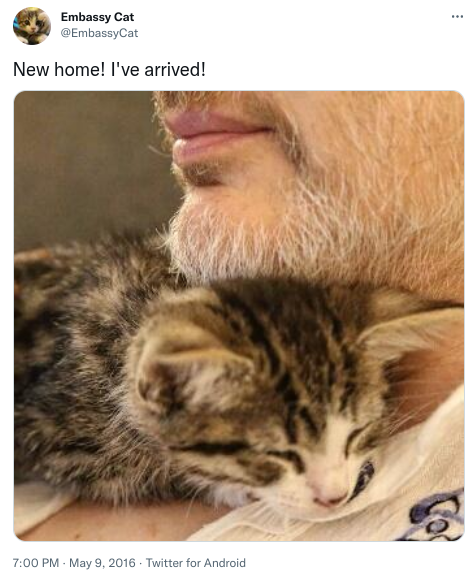
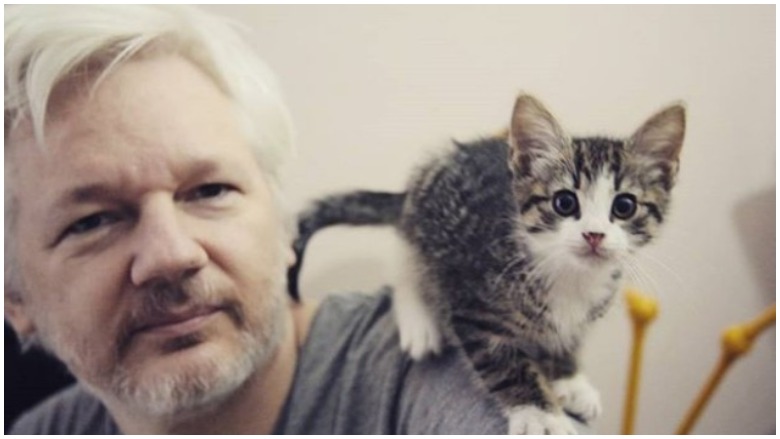
Assange’s latest anniversary in the embassy triggered another wave of global protest rallies, featuring celebrities including Patti Smith, Brian Eno, PJ Harvey, Noam Chomsky, Yanis Varoufakis, Ai Weiwei, Vivienne Westwood, and Ken Loach.
US film-maker Michael Moore, who said he was shocked by what he had learned when he recently visited Assange, promised to keep speaking up - but then went silent. Similarly pop star Lady Gaga, whose long, wierd interview with Assange was one of the most painful segments in the "RISK" movie, never spoke about him again. But other celebrities, such as British rapper M.I.A, TV star Pamela Anderson, and Pink Floyd founder Roger Waters, refused to be silenced.
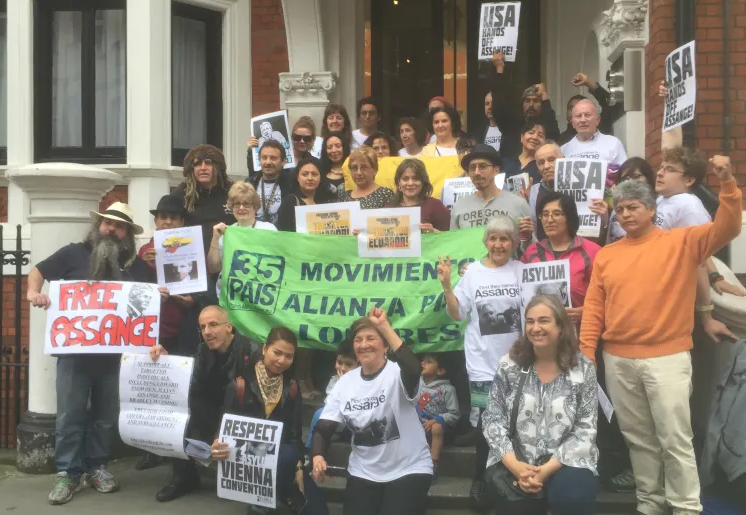
Supporters gathered again outside the embassy to celebrate the anniversary of Ecuador granting asylum, and again on Julian’s 45th birthday in early July.
*
Turkish AKP Leaks
There was a violent coup d’état attempt in Turkey on 15 July 2016, with over 300 people killed as an armed forces faction unsuccessfully attempted to overthrow President Recep Tayyip Erdoğan. Following the coup attempt, Erdoğan cracked down on his perceived political enemies, with tens of thousands arrested or fired from their jobs, including judges, teachers and journalists.
Four days after the failed coup, on 19 July 2016, WikiLeaks released 294,548 emails from Erdoğan’s ruling Justice and Development party (AKP). A second batch of 113,362 AKP emails was released on 5 August 2016.
The material was obtained a week before the attempted coup. However, WikiLeaks has moved forward its publication schedule in response to the government’s post-coup purges. We have verified the material and the source, who is not connected, in any way, to the elements behind the attempted coup, or to a rival political party or state.
The WikiLeaks website came under a sustained 24 hour attack before the Turkish government blocked access to the site. The leak itself was embarrassig for Erdoğan, but the contents of the emails - which dated from 2010 to July 6, 2016 - were not highly damaging. As WikiLeaks noted, the emails were associated with a domain that was "mostly used for dealing with the world, as opposed to the most sensitive internal matters".
There was a twist in the tail of this release. A hacker named Phineas Fisher claimed to have obtained the emails while working with others inside Turkey, one of whom sent a batch of emails to WikiLeaks. Fisher said the hackers still had access to the Turkish government network until it was shut down following the WikiLeaks release. Another UK-based hacker then reportedly dumped another batch of data, which included databases of personal information, and a security expert named Michael Best (later known as Emma Best) tweeted a link to this data online. WikiLeaks retweeted Best’s link, then deleted it as soon as they realised that it exposed personal data. Best then apologised for the mistake.
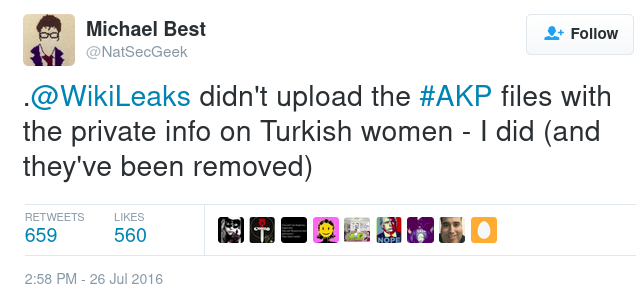
Although nobody was harmed as a result, this incident was then used as another excuse for mainstream media to blame WikiLeaks for putting Turkish lives in danger. Australian journalist Caitlin Johnstone later compiled a list of 31 such widely repeated attacks, debunking every one of them.
*
Murder of Seth Rich

At around 4:20 am on 20 July 2016, in the Bloomingdale neighborhood of Washington DC, a 27-year-old DNC employee named Seth Rich was shot twice in the back while walking home to his nearby appartment from a local bar. He died in hospital around 90 minutes later.
Washington police claimed Rich was most likely the victim of a botched robbery, but nothing was actually stolen from him. His face and body had bruises, indicating a violent scuffle. Although there were CCTV cameras all over the neighbourhood (an amateur sleuth counted 23 cameras between Seth Rich’s house and the bar where he had been drinking) police said they could only find a brief video of two assailants' legs.
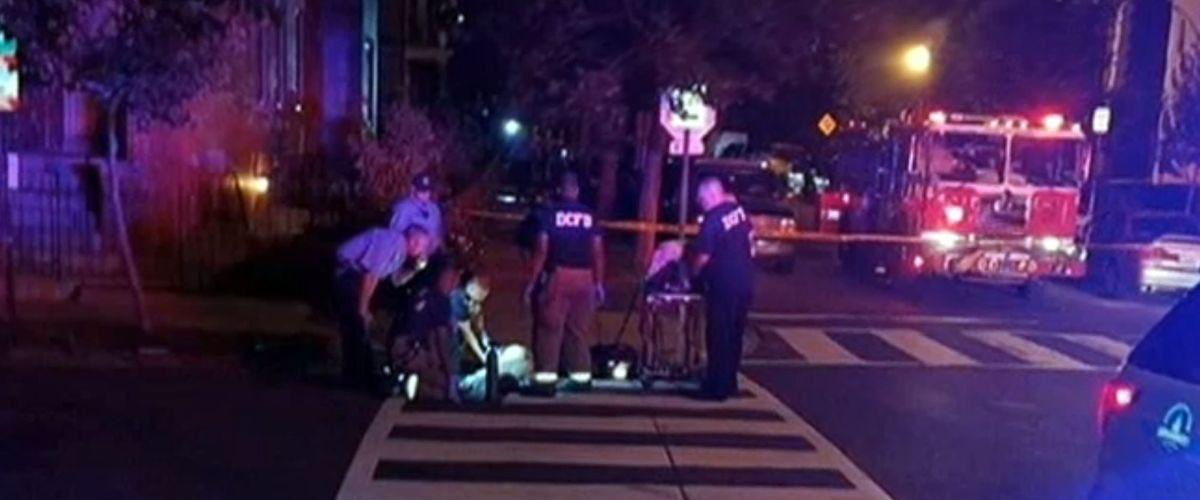
Initial reports claimed the FBI was not involved in the case, but they later admitted to possessing Seth Rich’s phone and laptop and even released some files.
In early August 2016 Julian Assange told Dutch TV:
"Whistleblowers go to significant efforts to get us material, often very significant risks. There’s a 27-year-old that works for the DNC who was shot in the back, murdered, just two weeks ago, for unknown reasons as he was walking down the street in Washington."
Was he saying that Seth Rich was a WikiLeaks source?
"I am suggesting that our sources take risks and they become concerned to see things occurring like that."
WikiLeaks offered a $20,000 reward to help find Seth Rich’s killer(s).
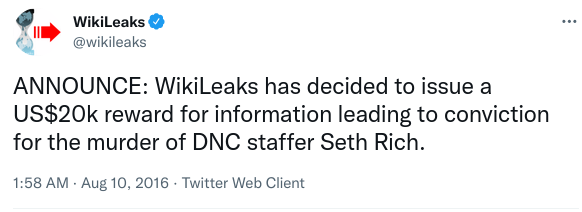
In 2019 online entrepreneur Kim Dotcom, a strong WikiLeaks supporter, told Consortium News how he had helped put Seth Rich (who used the name "panda" online) in contact with WikiLeaks:
"I was approached by a young gentleman over Twitter with the Twitter handle Panda-something and he told me that he’s working with the Democrat Party and he was fed up with what was happening in the US and he would be interested to talk with me. And then I took that straight into an encrypted channel where we chatted about what’s going on and we had a few back and forth and he told me that he had information that would be quite shocking if it was made public. He believed that there was massive corruption going on within the DNC. He was very concerned about voter fraud… So I said look, this was all very interesting, but I was in the middle of my case and I was involved in this massive fight against the US so I did not want to be the recipient of any of that information. So I put him in touch with someone that I know in the data security space that is very knowledgeable and has worked with WikiLeaks in the past and I simply established the contact between that person and this person. And everything that happened after that is what we know know as the DNC leaks / hack."
*
*
The author of this book can be found on Twitter: @Jaraparilla
*
Home - Genesis - 2007 - 2008 - 2009 - Early 2010 - Mid 2010 - Late 2010 - End 2010 - Early 2011 - Mid 2011 - Late 2011 - End 2011 - Early 2012 - Late 2012 - Early 2013- Late 2013 - 2014 - 2015 - Early 2016 - Late 2016 - 2017-19
Copyright Gary Lord 2021, 2022, 2023